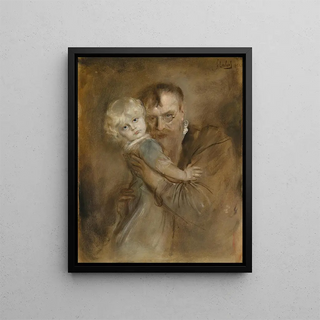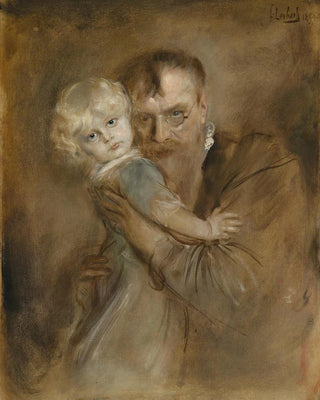Art print | Self-portrait with his daughter Marion - Franz von Lenbach


View from behind

Frame (optional)
In the vast panorama of 19th-century art, certain works stand out for their ability to capture the essence of human relationships and deep emotions. The art print Autoportrait avec sa fille Marion by Franz von Lenbach is a shining example. This canvas, both intimate and universal, immerses us in a moment of tenderness between a father and his daughter, revealing an emotional dimension that transcends the simple portrait. The soft light bathing the faces, along with the delicate expressions, invites us to explore the depth of family bonds and the unconditional love that unites a parent with their child. Every brushstroke seems to tell a story, a memory frozen in time, where the artist succeeds in immortalizing not only an image but also intense feelings.
Style and uniqueness of the work
The art print Autoportrait avec sa fille Marion is characterized by a style that combines realism and intimacy, typical of the Munich school to which Lenbach belonged. The artist, known for his mastery of portraits, uses warm colors and natural light that bring the characters to life. The composition is carefully balanced, highlighting the faces of Lenbach and his daughter, while creating a visual dialogue between them. The meticulous details, such as the attentive gaze of the little girl and the serene expression of the father, demonstrate remarkable technical skill. The blurred, almost ethereal background allows the figures to stand out, thus enhancing the intimacy of the scene. This work reminds us that art is not only a representation of reality but also a means of expressing deep emotions and feelings, making each observation unique and personal.
The artist and his influence
Franz von Lenbach, born in 1836, marked his era with his ability to grasp the human psyche through his portraits. A student of the illustrious painter Karl von Piloty, Lenbach quickly established himself as a master in the art of portraiture, attracting the attention of many personalities of his time, including political and artistic figures. His style, influenced by Romanticism and Realism, paved the way for a new approach to portraiture, where the psychology of the subjects is emphasized.

Matte finish

View from behind

Frame (optional)
In the vast panorama of 19th-century art, certain works stand out for their ability to capture the essence of human relationships and deep emotions. The art print Autoportrait avec sa fille Marion by Franz von Lenbach is a shining example. This canvas, both intimate and universal, immerses us in a moment of tenderness between a father and his daughter, revealing an emotional dimension that transcends the simple portrait. The soft light bathing the faces, along with the delicate expressions, invites us to explore the depth of family bonds and the unconditional love that unites a parent with their child. Every brushstroke seems to tell a story, a memory frozen in time, where the artist succeeds in immortalizing not only an image but also intense feelings.
Style and uniqueness of the work
The art print Autoportrait avec sa fille Marion is characterized by a style that combines realism and intimacy, typical of the Munich school to which Lenbach belonged. The artist, known for his mastery of portraits, uses warm colors and natural light that bring the characters to life. The composition is carefully balanced, highlighting the faces of Lenbach and his daughter, while creating a visual dialogue between them. The meticulous details, such as the attentive gaze of the little girl and the serene expression of the father, demonstrate remarkable technical skill. The blurred, almost ethereal background allows the figures to stand out, thus enhancing the intimacy of the scene. This work reminds us that art is not only a representation of reality but also a means of expressing deep emotions and feelings, making each observation unique and personal.
The artist and his influence
Franz von Lenbach, born in 1836, marked his era with his ability to grasp the human psyche through his portraits. A student of the illustrious painter Karl von Piloty, Lenbach quickly established himself as a master in the art of portraiture, attracting the attention of many personalities of his time, including political and artistic figures. His style, influenced by Romanticism and Realism, paved the way for a new approach to portraiture, where the psychology of the subjects is emphasized.






